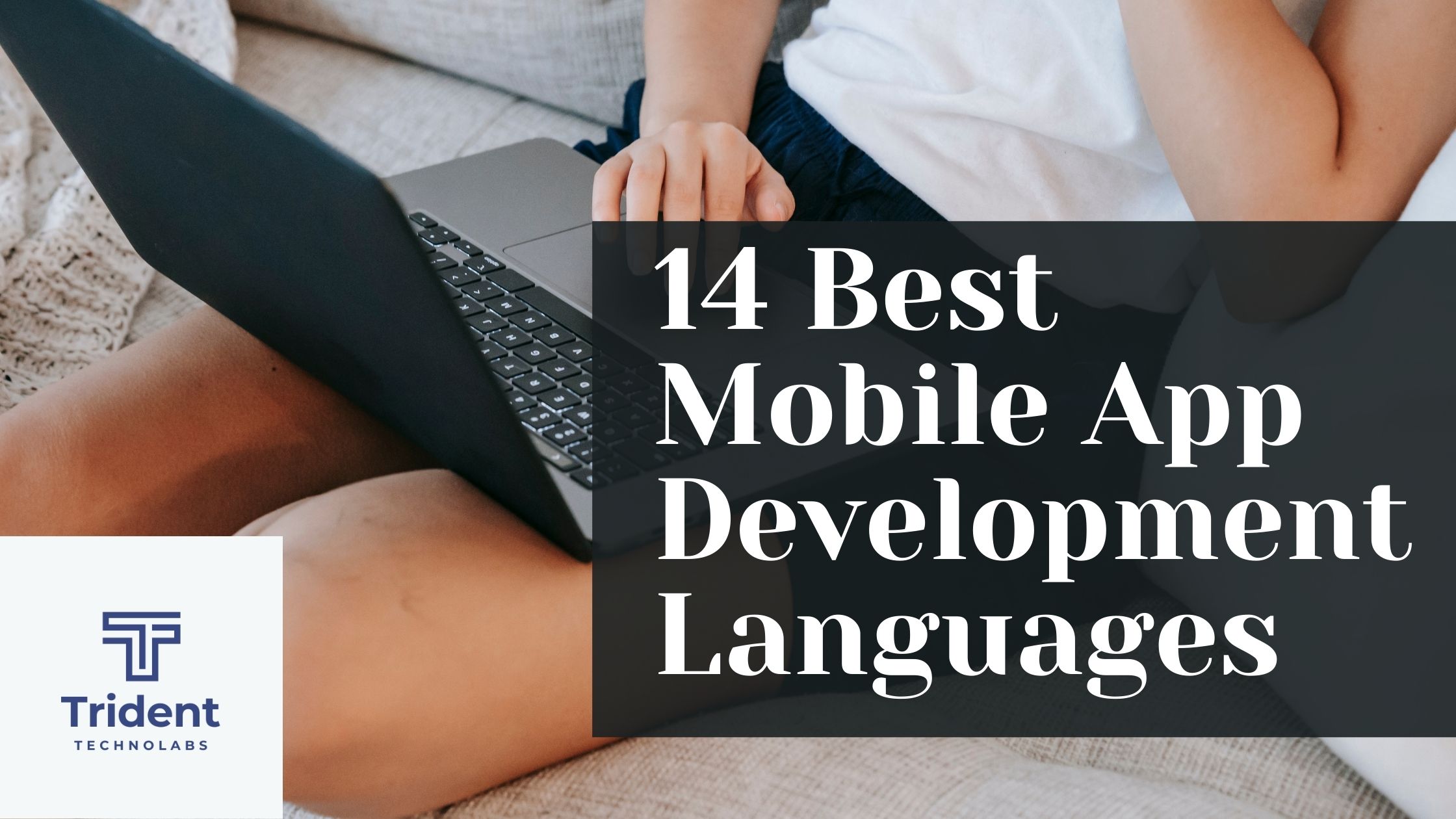
14 Best Mobile App Development Languages for Developers in 2022
Just to burst your bubble right away, there is no universal language for mobile app development. The reason is that it largely depends on what your goals are. This means you need to discover your goals first in order to choose the right app development languages.
Being a mobile app developer, whether you are looking for a job, want to develop an app for a specific platform, or want to keep your options as open as possible, you will need to consider all these factors to find the best mobile app development languages.
This is list of the best mobile app development languages:-
- Swift
- Objective-C
- C++
- Python
- HTML5
- Flutter (Uses Dart language)
- JAVA
- Kotlin
- XML
- C
- JavaScript
- HTML & CSS
- Lua
- Dart
But how will you find the best language for mobile app development from the above list which perfectly fits your requirements? Don’t worry! To make this easy for you, we have bifurcated the best language for app development based on various factors and shared their pros and cons, too, so that you can choose the best language for your project. Let’s find out!
Types of Mobile Apps
According to Statista, there are more than 2.8 million apps available on Google Play Store and more than 1.9 million on Apple App Store. But have you ever wondered which app is a native, hybrid, or progressive web app?
Yes, all these are the types of mobile apps, and being a mobile app developer, you can create an app under these 3 categories. For you, it is essential to know about the types of mobile apps in order to find the right language which matches your requirements.
Therefore, let’s check the differences first:
| Factor | Native | Hybrid | Progressive Web App |
|---|---|---|---|
| Development Languages | Native Only | Native and web or web only | Web-only |
| Performance | Best and Fast | Good | Poor |
| Access to Device Features | Access to all device features | Access to device features via plugins | Access to device features via HTML5 |
| Development Time | Higher | Less | Least |
| Code Updates | Regular updates | Doesn’t impact | Doesn’t impact |
| Limitations | None | Access to hardware features is via plugins | Limited hardware features |
| Security Concerns | Best security features | More prone to attacks | More prone to attacks |
| User Experience | High | Medium | Low |
| Offline Presence | Yes | Yes | No |
| Native API access | Complete | Partial to High | Low |
| Cross-platform / code reusability | No | Yes | Yes |
Note: We have compared all these types with each other.
In case you want to know them in detail, go through the following information on all the types of mobile apps.
Native Apps
Native apps are intended to run on a specific platform. This means, if you intend to build an app for the iOS platform, then it will not work on the Android platform and vice-versa.
So, here you build an app either for iOS or Android, both separately. The reason for building platform-specific apps is to ensure the best performance and high reliability.
These apps can be installed through respective app stores, such as Google Play Store and App Store. The prime examples of native apps are Lyft and Twitter.
Hybrid Apps
On the other hand, hybrid apps are a mixture of native apps and web apps. Therefore, it is also known as cross-platform apps. These apps will run on multiple platforms.
This means, if you intend to build an app for a particular platform or operating system, it will still work well on the other platforms. Apps made using technologies such as Xamarin and React Native will come under the category of hybrid apps.
Hybrid apps can be easily developed with lesser development time because it uses a single code base to work on multiple mobile operating systems. The prime examples of hybrid apps are WhatsApp and Wikipedia.
Progressive Web Applications (PWA)
Progressive web apps run in the URL of a device’s web browser and are intended to work on any web platform that uses a standards-compliant browser, such as desktop as well as mobile devices. It uses common web technologies, including HTML, CSS, and JavaScript, to build applications.
It gives you a feel of a mobile application, but you cannot deliver it natively on the device. Therefore, it is known as PWA, and the prime examples are Starbucks, and Pinterest.
Now, it will be easy for you to bifurcate the best programming language for mobile application development. So, let’s check each programming language.
Programming Languages for iOS App Development
These are the 6 best programming languages if you want to develop iOS apps. We have compared programming languages for mobile based on many factors that you should consider while selecting the best language.
| Major Factors | Swift | Objective – C | C++ | Python | HTML5 | Flutter |
|---|---|---|---|---|---|---|
| Developed in | 2010 | 1984 | 1985 | 1991 | 2014 | 2017 |
| Developed by | Apple Inc. | Tom Love & Brad Cox | Bjarne Stroustrup | Guido Van Rossun | W3C | |
| Type | – General Purpose – Multi Paradigm | – Object Oriented | – General Purpose | – Open Source | – Markup Language | – Open Source UI SDK |
| Active Developers | 2.3 million | 1.4 million | 6.3 million | 9 million | 1.3 million | 2 million |
| Current Version | Swift 5.5.2 | Objective – C 2.0 | C++ 20 | Python 3.10.1 | HTML 5.2 | Flutter 2.8 |
| Famous App | Youtube | Netflix | Google Pay | |||
| Download | Swift | Objective – C | C++ | Python | HTML5 | Flutter |
1. Swift – A Powerful and User-friendly Programming Language
Swift is one of the mobile application development languages, developed by Apple Inc. and helps apps run on various platforms, such as macOS, iOS, and watchOS, tvOS. It comes with various features, such as fast coding style, the safety of data storage, and easy-to-use syntax.
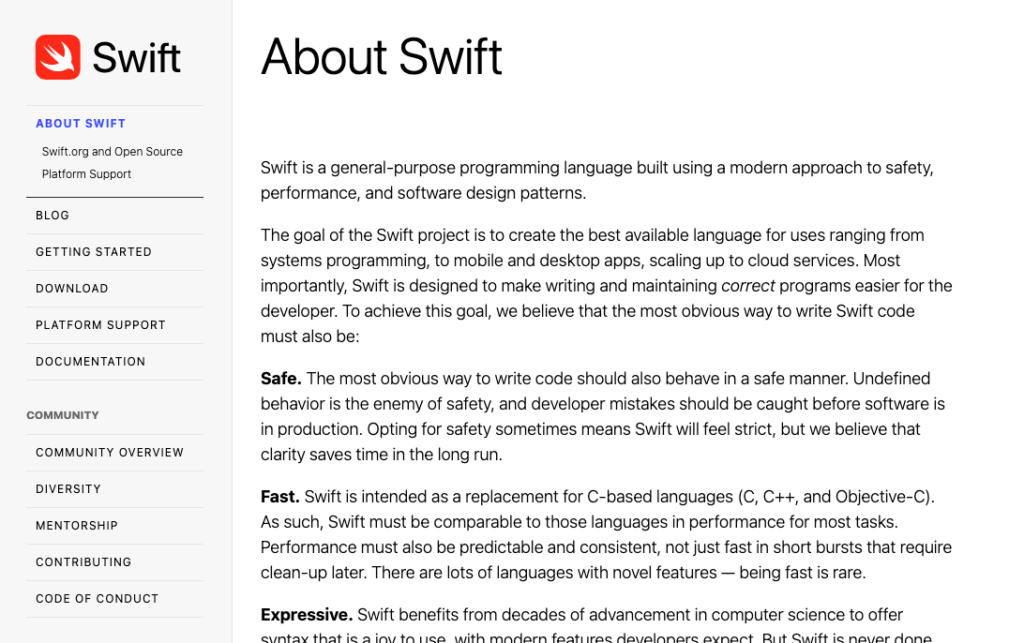
Moreover, Swift programming is interactive, and the syntax is very concise, which makes this language safer by design. It automatically removes unsafe code to have a highly secure coding environment. And for the best-integrated development environment, you can rely on Xcode.
Pros and Cons of Swift Programming Language
| Pros | Cons |
|---|---|
| Requires low maintenance Fast coding style and faster execution Can avoid a few bugs of Objective-C Less maintenance and great reliability | Needs regular updates as it is new in the market Quite young to build heavy apps Has backward compatibility issues |
2. Objective-C – OOP Programming Language
Objective-C is an object-oriented programming language that was first developed by Apple to support apps on its platforms. It uses syntax from C and adds Smalltalk-style messaging to provide flexible and easy solutions to programming issues.
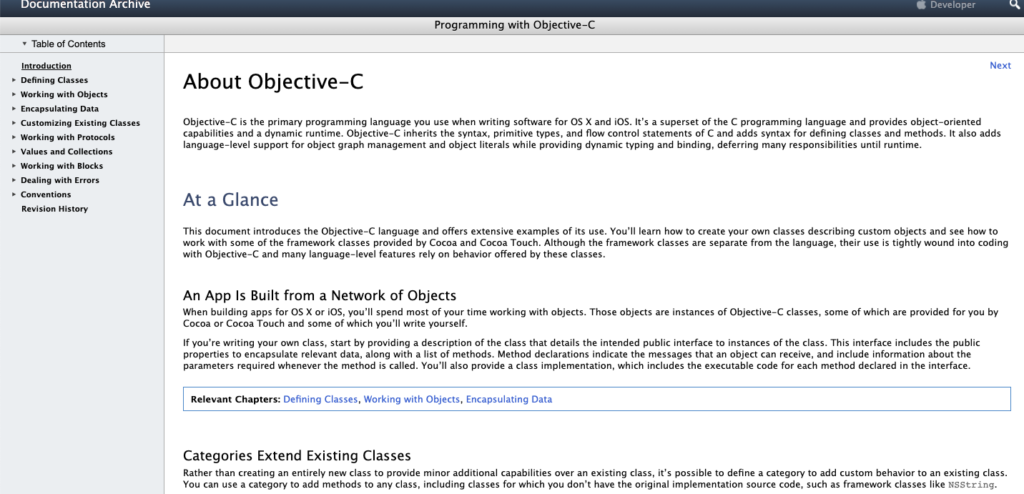
Being developed in 1984, it is a very mature and well-updated programming language. That’s not all. It is more stable than Swift and highly compatible with C and C++ libraries.
Pros and Cons of Objective-C Programming Language
| Pros | Cons |
|---|---|
| More stable and easy usage of private APIs Has easy compatibility with C++ libraries A lot of legacy codes support the nest coding style | Doesn’t support dynamic libraries as they are larger in size Extended coding may be time-consuming |
3. C++
iOS app development becomes much easier with C++ because of Objective-C. C++ is the extension of the C language. It is recommended because you have a lot of control over overusing system resources and memory.
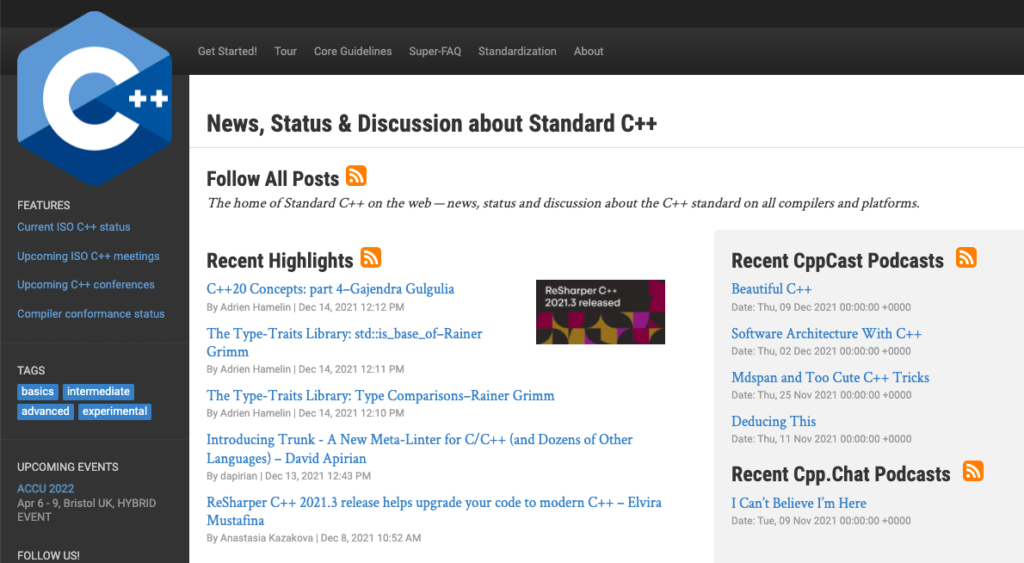
It is powerful as well as flexible and makes it easy for operating systems, browsers, and game development. Its features include rich libraries, fast development, and dynamic memory allocation, making it one of the best choices for app development.
Pros and Cons of C++ Programming Language
| Pros | Cons |
|---|---|
| Has ready-to-use in-built libraries and compilers The garbage collector doesn’t run in the background You have full control over the app development process | Has complex syntax and small standard libraries More complicated to master because it is not well-designed Has a complex and dynamic memory allocation |
4. Python
Python is easy to learn, even if you are a first-time programmer. It is an open-source programming language, making it freely usable and shareable. Also, it allows you to code programs in fewer lines compared to other languages.
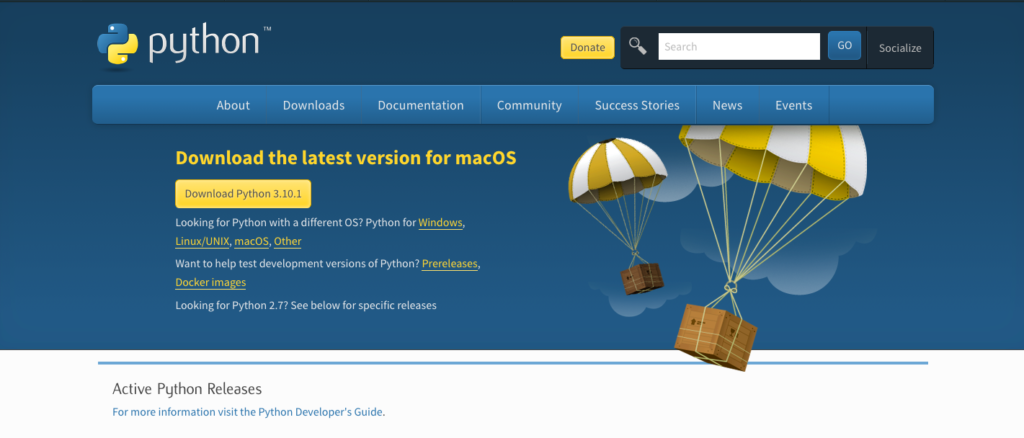
This programming language will help you to work more quickly and integrate your systems more effectively, with low-cost maintenance. All this makes it one of the most popular server-side scripting languages.
Pros and Cons of Python Programming Language
| Pros | Cons |
|---|---|
| Easy to learn, use, and deploy Used for analyzing and software development Multi-platform and multi-system support | Takes much time to execute Inefficient with modern mobile app development Limited data access |
5. HTML5
HTML5 is the latest evolution of HTML, and it is the most popular markup language. This helps to structure and present content on the world wide web. Not only easy to learn because of cleaner and more improved code, but it also offers well-designed forms and ensures better accessibility.
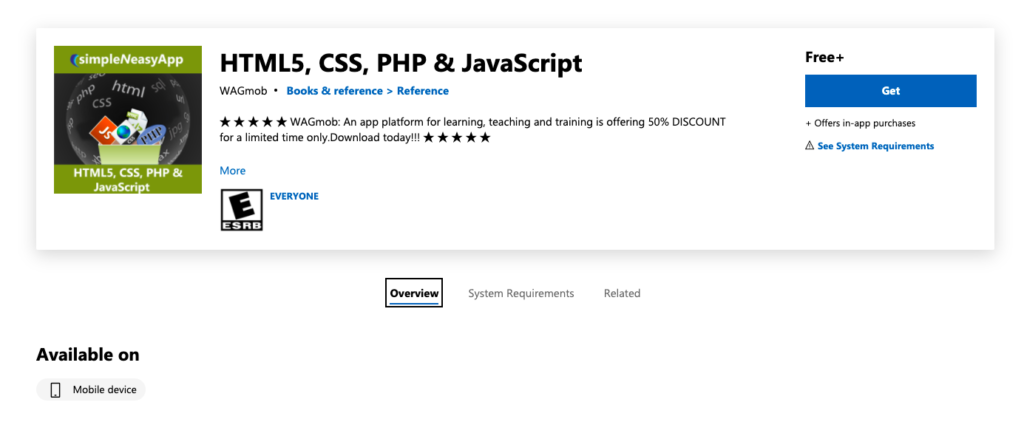
If you are planning to build location-based apps, then this can be the right choice. Its latest features like media elements, multi-platform functionality, and agile market deployment help to manage the app development process efficiently.
Pros and Cons of HTML5 Programming Language
| Pros | Cons |
|---|---|
| Helps to support various versions of major browsers Easy interactivities without external plugins Support offline access and takes less time | Challenging to support old browsers Put various restrictions on multimedia Has inconsistencies in delivery |
6. Flutter (Uses Dart Language)
It is an open-source SDK, which uses the Dart programming language to develop iOS apps. Flutter is recommended because it comes with the full support of native features.
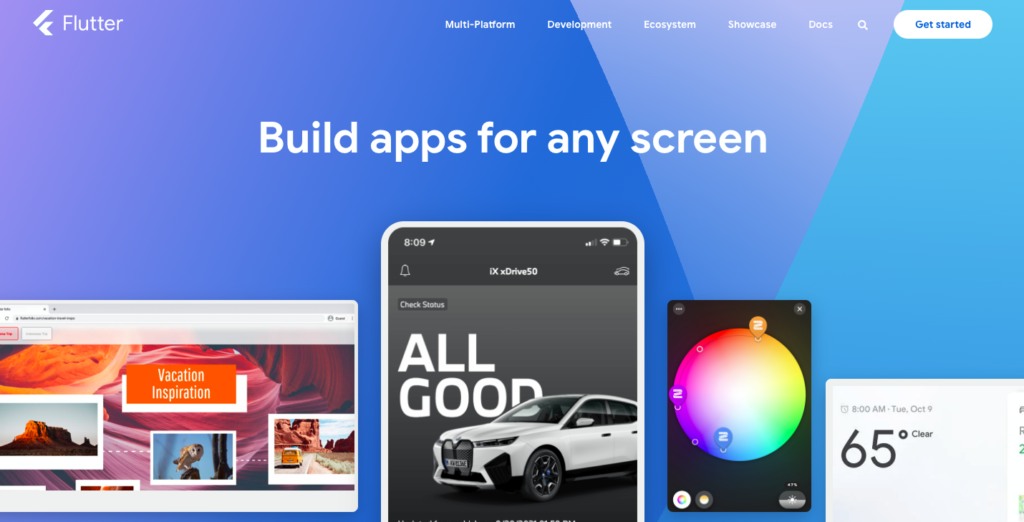
Moreover, it has the feature of hot reload. This means, if you update any changes in the code, it will reflect the changes within seconds after you load it. Features like less development time and fast time-to-market speed make it an ideal choice for developing iOS apps.
Pros and Cons of Flutter
| Pros | Cons |
|---|---|
| Takes less time to develop apps Hot reload feature to update the changes within seconds Can use the same UI across all the platforms Best performance similar to native | Apps have a larger size |
Moving ahead, let’s check the best programming languages for Android app development.
Programming Languages for Android App Development
If you have an interest in Android app development, then this list is for you. We have shared the top 5 languages that you need to consider to create Android apps. Are you wondering about applications on the Android OS are mostly written in what programming language? We have listed down the major factors and languages which are used to develop Android applications. Let’s check the list with major factors:
| Major Factors | Java | Kotlin | C++ | XML | C | Flutter |
|---|---|---|---|---|---|---|
| Developed in | 1995 | 2011 | 1985 | 1998 | 1972 | 2017 |
| Developed by | James Gosling | JetBrains | Bjarne Stroustrup | W3C | Dennis Ritchie & Bell Labs | |
| Type | – Object Oriented | – General Purpose | – General Purpose | – Markup Language | – General Purpose | – Open Source UI SDK |
| Active Developers | 8.2 million | 2.3 million | 6.3 million | – | 6.3 million | 2 million |
| Current Version | Java SE 15 | Kotlin 1.6.10 | C++ 20 | XML 1.1 | C 17 | Flutter 2.8 |
| Famous App | Youtube | Adobe Photoshop | Google Pay | |||
| Download | JAVA | Kotlin | C++ | XML | C | Flutter |
1. JAVA
JAVA is the best programming language for mobile apps as it is an object oriented programming language. The advantage of using JAVA is that it has in-built open-source libraries for mobile app developers. Not only easy to handle, but it also offers the best documentation and community support.
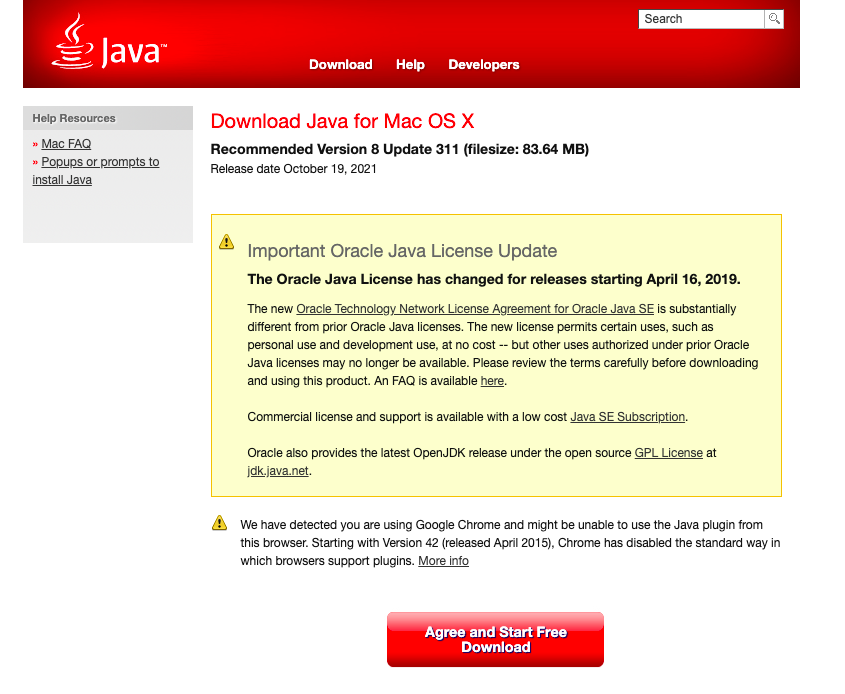
Moreover, abstraction, encapsulation, inheritance, and polymorphism are some of its features, making it one of the best languages for Android app development as well as cross-platform app development.
You can also use XML with JAVA as a mode of communication. This will help you to communicate between different applications. XML helps to store and transfer data. And for the best-integrated development environment, you can rely on Android Studio.
Pros and Cons of JAVA Programming Language
| Pros | Cons |
|---|---|
| Comes with simple syntax Highly standard for enterprise computing Less chance of security breach Easy to write and compile | Need to pay for commercial license Some bugs may be found in a virtual machine Doesn’t provide backup facilities |
2. Kotlin
Kotlin allows mobile app developers to develop powerful apps. This is one of the popular programming languages which enhances code maintainability and readability that means engineers can write, read, and change code more efficiently. Pinterest, Trello, Evernote, BaseCamp 3, and Coursera are some of the most popular apps that are built using Kotlin.
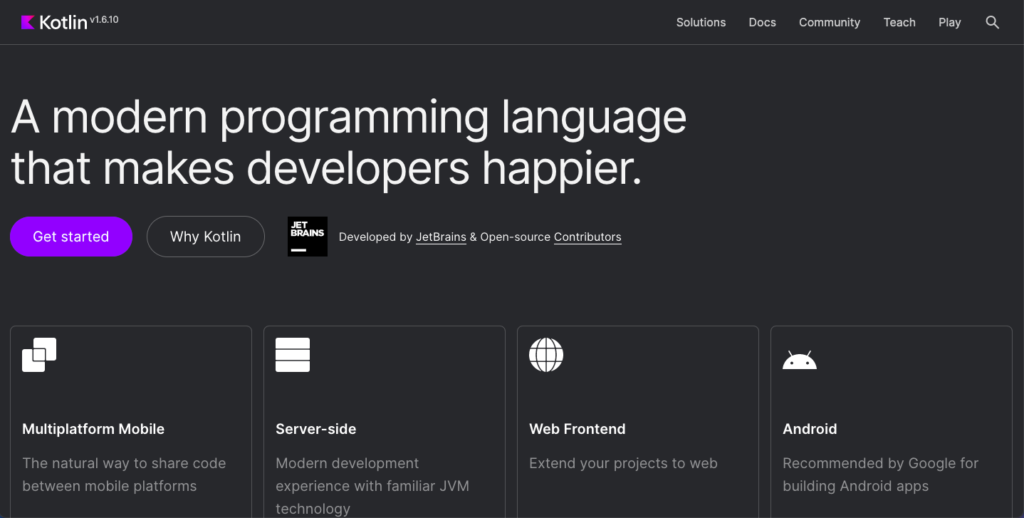
It is an alternative language to JAVA for developing apps for Android. With Kotlin, you can access all JAVA libraries and can use it for anything where Java is used today, including server, client, web, and Android development.
In the same way, you can also use XML with Kotlin to transfer and store data. To know more about XML, check the next language in this list.
Pros and Cons of Kotlin Programming Language
| Pros | Cons |
|---|---|
| Easy to comply with existing Java code Can be easily maintained because it offers a clear and compact codebase Kotlin is more stable and consistent | Keeps fluctuating the compilation speed Smaller developer community Resources are less to learn Kotlin |
3. C++
C++ does not only help to build iOS apps but also Android apps. This is the reason we have mentioned it twice in our list. Android NDK toolset will allow you to have native code using C++ language.

C++ is recommended over JAVA because it has a smaller memory footprint and good portability. Moreover, it is a superset of C and has the ability to compile virtually all C programs. Later, you can reuse the C software according to your requirements.
Pros and Cons of C++ Programming Language
| Pros | Cons |
|---|---|
| Can be faster than JAVA Low-level manipulation of data Offers good portability and platform-independent Total control over memory management | Harder to integrate Many features are not designed well Security issues |
4. XML
XML is a markup language. It makes it easy to develop Android apps because it describes data and introduces various elements. Precisely, it helps to set the layout buttons and images to define the font, color, and all the by default texts.
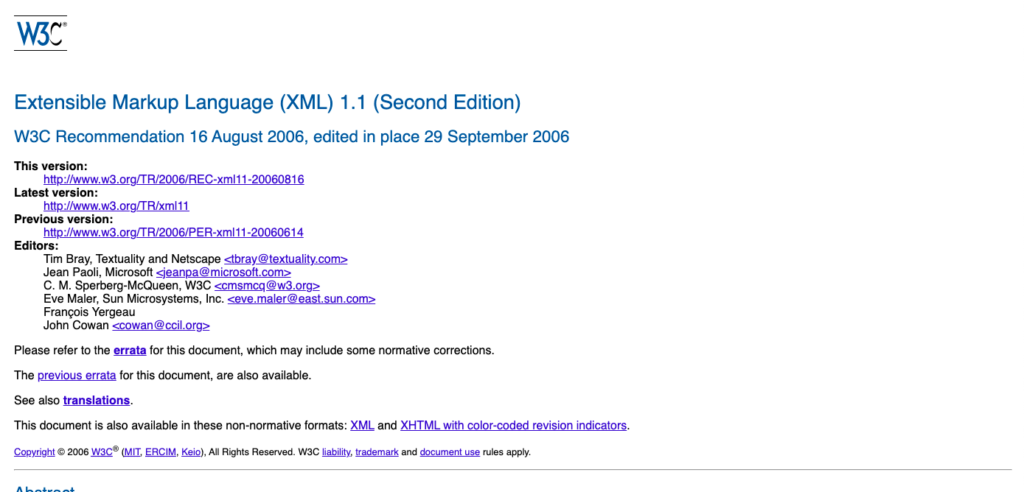
It also makes sure that the encoding documents are in a set that is easily readable by machines and humans. XML is very much like HTML and helps in storing and transferring data.
Pros and Cons of XML Programming Language
| Pros | Cons |
|---|---|
| Platform independent so can be used on various systems Supports Unicode and allows to transmit any human-written information Data stored and transferred can be changed at any moment Allows validation with DTD and Schema for error-free syntax Simplifies the ways to share data over different platforms | Doesn’t support an array Syntax redundancy will cause you higher storage File sizes are usually large |
5. C
This language helps to develop Android apps and makes the whole process easier as C code can call Java code with the standard Android libraries. Java code has the ability to call native functions defined in C code.

It increases performance, leverages direct low-level programming, and can easily utilize the libraries written in C code. When programming with C, get the benefits of headers and libraries to create activities, handle user input, and get access to many other resources.
Pros and Cons of C Programming Language
| Pros | Cons |
|---|---|
| You get the in-built functions Has a variety of data types and operators Ability to extend itself | Lack of exceptional handling Doesn’t have a concept of OOPs No runtime checking Low level of abstraction |
6. Flutter (Uses Dart Language)
It is an open-source SDK, which uses the Dart programming language to develop Android apps. Flutter is recommended because it comes with the full support of native features.

Moreover, it has the feature of hot reload. This means, if you update any changes in the code, it will reflect the changes within seconds after you load it. Features like less development time and fast time-to-market speed make it an ideal choice for developing android apps.
Pros and Cons of Flutter
| Pros | Cons |
|---|---|
| Takes less time to develop apps Hot reload feature to update the changes within seconds Can use the same UI across all the platforms Best performance similar to native | Apps have a larger size |
Programming Languages for Hybrid App Development
If you want to develop hybrid apps, then you must check the following app development languages. Based on some major factors, compare each language and find the best which completely fits your requirements.
| Major Factors | JavaScript | HTML & CSS | Lua | Dart |
|---|---|---|---|---|
| Developed in | 1995 | 1993 & 1996 | 1993 | 2017 |
| Developed by | Brandon Eich | W3C | Roberto lerusalimschy, Luiz Henrique de Figueredo & Waldemar Celes | |
| Type | – Multi Paradigm | – Hypertext Markup – Cascading Style Sheets | – High level – Multi Paradigm | – Client optimised |
| Active Developers | 12.4 million | 1.3 million | 700K | 2 million |
| Current Version | ECMAScript | HTML 5 & CSS 3 | Lua 5.4.3 | Dart 2.15 |
| Famous App | Candy Crush | Netflix | Celestia | Alibaba |
| Download | JavaScript | HTML & CSS | Lua | Dart |
1. JavaScript
JavaScript can easily comply with a wide array of programming languages. Also, it runs seamlessly in other environments and outside of browsers. This makes it easy to control and manage every development process.
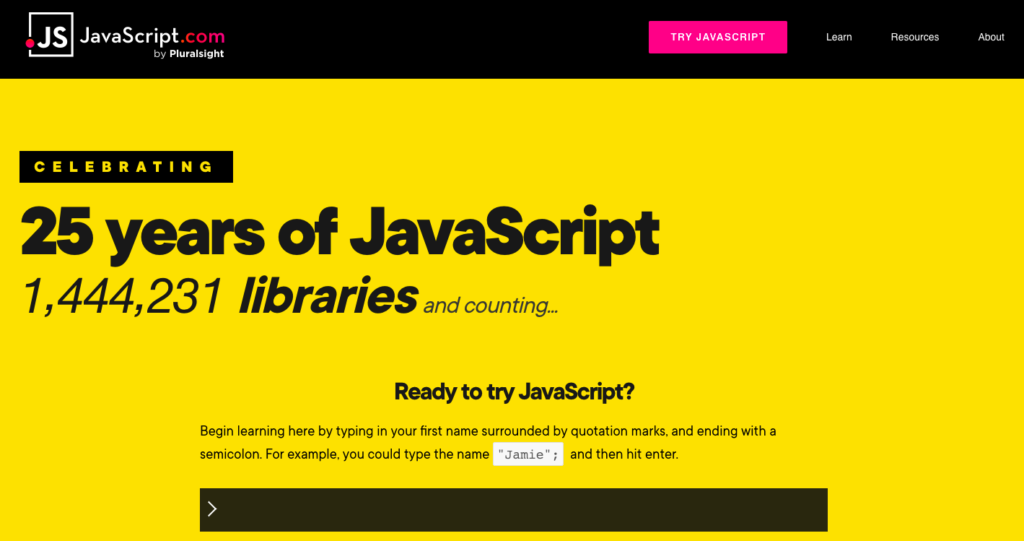
With the help of JavaScript, you can build effective and interactive apps. This is highly recommended because it can be used across various platforms, including iOS, Android, and Windows.
Pros and Cons of JavaScript Programming Language
| Pros | Cons |
|---|---|
| Can be used in various ways through Node.js Doesn’t need to be compiled for browsing Easy to control and manage | Vulnerable Enough to be exploited for malicious purpose May encounter some browser-related issues Difficult to predict the output of client-side scripts |
2. HTML & CSS
HTML and CSS are two core technologies that help build hybrid apps. HTML will provide the structure, and CSS will function to the layout for different devices.
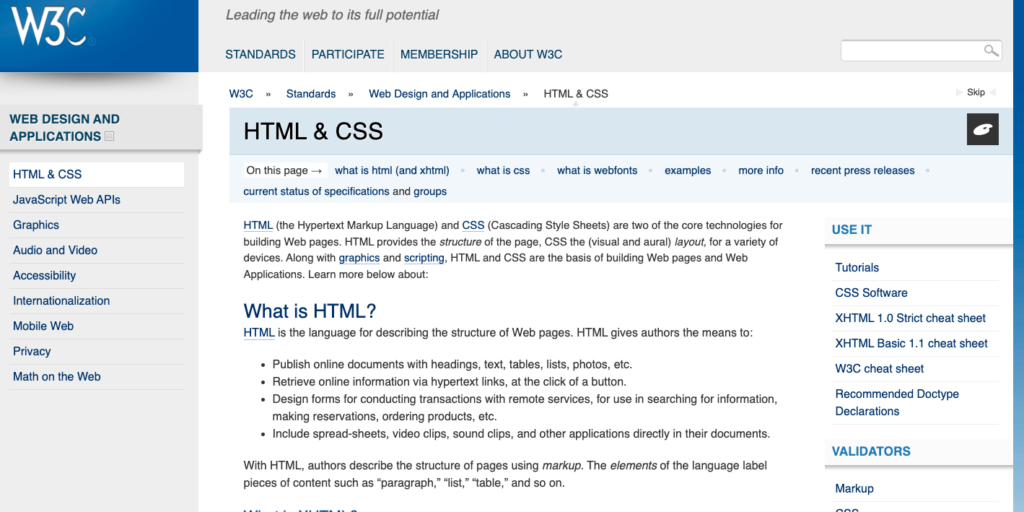
HTML is platform-independent and will help you to add images, videos, audios, and hypertext to the text. On the other hand, CSS will help you control the color of the text, font size, spacing, size of columns, background images, designs, screen size, and various effects.
Pros and Cons of HTML & CSS Programming Language
| Pros | Cons |
|---|---|
| Safe to use across all the platforms Get the complete UI to focus on the creative side Clean and stable code | To work with mobile app development framework, need to learn their syntax Need to depend on the author of the framework |
3. Lua
Lua is the fastest language and can be easily learned. If you want to improve the speed of the app, then Lua is the best choice. You can use Lua for all sorts of applications, from gaming apps to web applications.
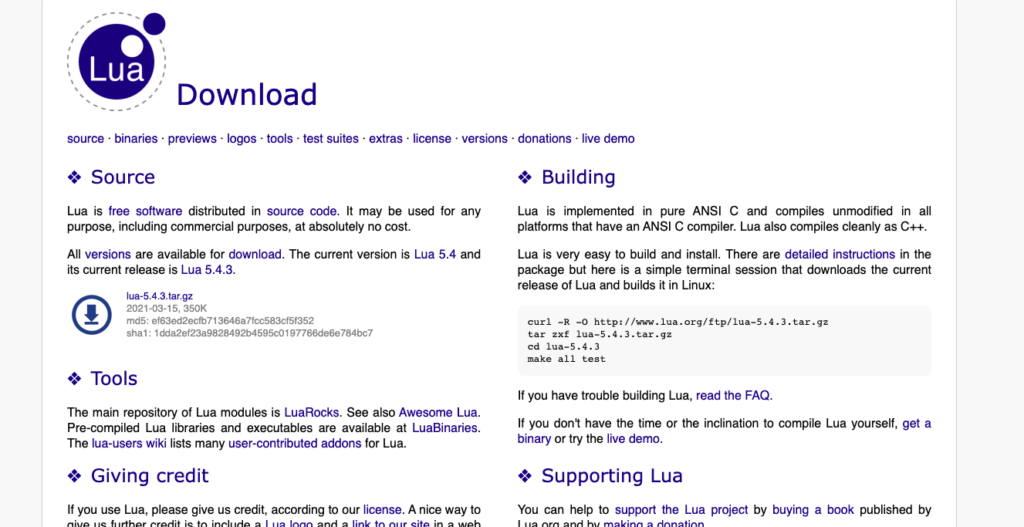
Lua is a lightweight and embeddable scripting language that helps secure real-time messages and analytics dashboards, making it easy to share files and a two-touch conference call.
Pros and Cons of Lua Programming Language
| Pros | Cons |
|---|---|
| Fastest language and takes least runtime memory Helpful in error-handling Provides easy integration with C and well documented | Has amount of code comments Difficult to learn and execute for beginners Has poor garbage collection capacity |
4. Dart
Dart is a client-optimized programming language. It is a simple and highly efficient mobile app development language and helps apps run on multiple platforms. Dart is very flexible in that you can write code to run it anywhere without having any significant limitations.
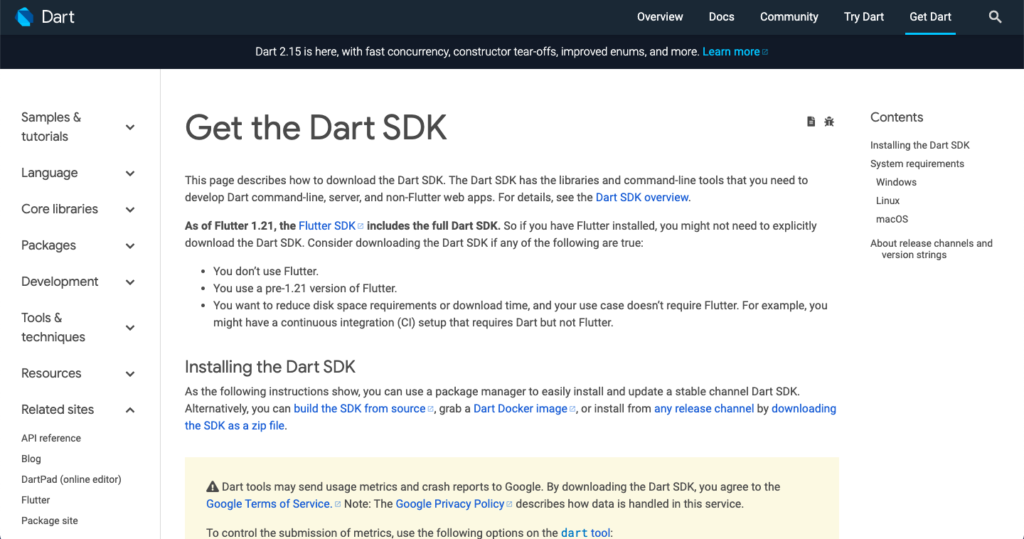
Dart is an open-source and garbage-collected language with C-style syntax. It can either be compiled with native code or JavaScript and equips us with Flutter, a mobile app development framework.
Pros and Cons of Dart Programming Language
| Pros | Cons |
|---|---|
| All the features are described in detail Has high performance and run faster Stable and used to build real-time apps Offers DartPad to work without installation | Limited resources are found online New and rarely used in the market Has an absence of native support |
This was all about the best app development languages for mobile app development. If you still have some queries in your mind, feel free to contact us.


Pingback: Native vs Cross Platform Debate: The Best App Development Approach - Trident Technolabs